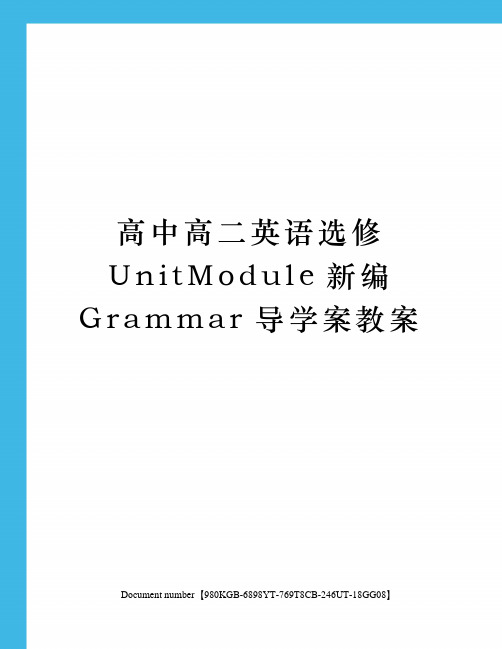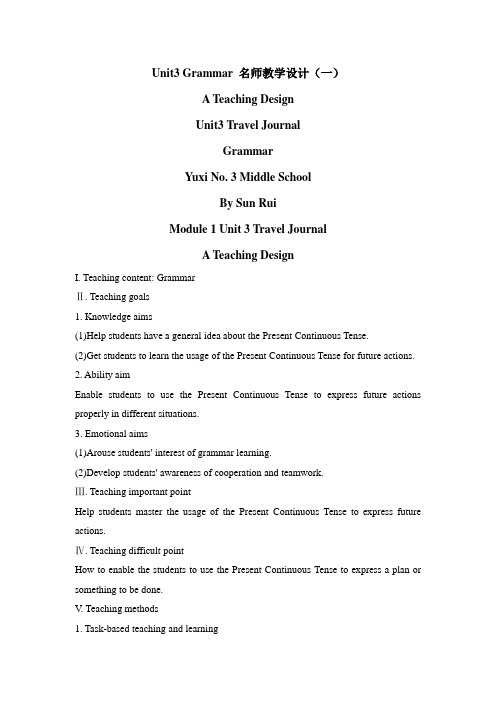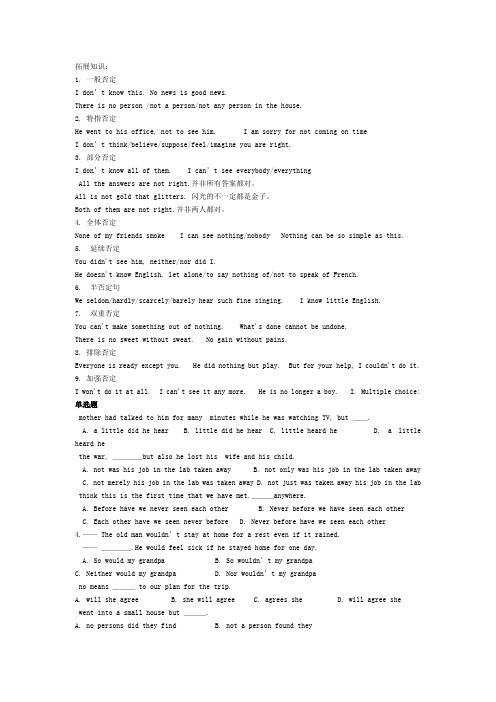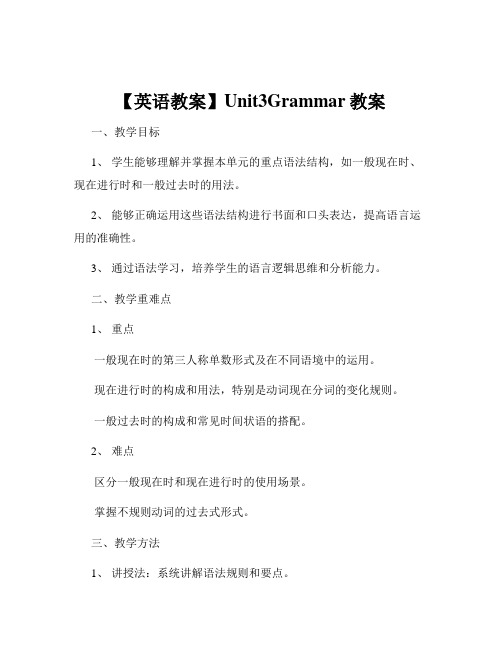高中ModuleUnitGrammar学案教案
高中高二英语选修UnitModule新编Grammar导学案教案

自主学习:
四、过去将来时(C)级)
1. 表示从过去某一时间看将来要发生的动作或存在的状态。过去将来时在宾语从句里最常见。如:
He said he would come.
I thought you would help him.
你今晚八点钟来时,我将会写完文章了。
By next year our teacher(teach) English for twenty years.
到明年我们的老师将已教二十年英语了。
Step3 Practice(当堂检测) and tennis for the school
3.常用hope,expect,think,intend,want,suppose等动词的过去完成时来表示未实现的希望、打算或意图。
例如:We had expected that you would be able to win the match.
合作探究:
1.Helenher keys in the office so she had to wait until her husbandhome.
C.haven’t recognized D.don’t recognize
2.─Your phone number againI______quite catch it.
─It's 9568442.
A.didn'tB.couldn'tC.don'tD.can't
3.—You haven't said a word about my new coat, Brenda. Do you like it
人教课标版必修一英语Unit3 Grammar 课程教学设计(一)

Unit3 Grammar 名师教学设计(一)A Teaching DesignUnit3 Travel JournalGrammarYuxi No. 3 Middle SchoolBy Sun RuiModule 1 Unit 3 Travel JournalA Teaching DesignI. Teaching content: GrammarⅡ. Teaching goals1. Knowledge aims(1)Help students have a general idea about the Present Continuous Tense.(2)Get students to learn the usage of the Present Continuous Tense for future actions.2. Ability aimEnable students to use the Present Continuous Tense to express future actions properly in different situations.3. Emotional aims(1)Arouse students' interest of grammar learning.(2)Develop students' awareness of cooperation and teamwork.Ⅲ. Teaching important pointHelp students master the usage of the Present Continuous Tense to express future actions.Ⅳ. Teaching difficult pointHow to enable the students to use the Present Continuous Tense to express a plan or something to be done.V. Teaching methods1. Task-based teaching and learning2. Cooperative learning3. DiscussionVI. Teaching aids:1. The multi-media2. The blackboardVII. Teaching ProceduresStep 1 GreetingGreet the students as usual.Step 2Lead-in1. Show the pictures of some activities on the screen and ask the students to answer the question “What is she/he doing?”【设计意图】通过观看与各种活动有关的图片,说出图片中的人物正在做什么,调动学生的热情,激起学生的学习兴趣,为本节课创设良好的开端。
高中英语ModuleUnitGrammar动词不定式与动名词学案外研版必修

江苏省常州市西夏墅中学2012-2013学年高一英语学案:Module5 Unit1 Grammar---动词不定式与动名词(外研版必修1)I Learning aims1.掌握动词不定式“to”与“v-ing”的常规用法。
2.熟悉不定式符号“to”的省略情况。
3.灵活运用动词不定式与动名词的时态、语态及否定形式。
4.区分一些动词后+ “to do”与“doing”的不同意思。
5.掌握动名词复合结构的用法。
II Learning proceduresStep 1 Different functions of To-infinitive⒈作主语动词不定式作主语时,句子的谓语动词常用单数,其位置有以下两种:(1)把不定式置于句首。
如:To get there by bike will take us half an hour.(2)用it作形式主语,把真正的主语不定式置于句后,常用于下列句式中。
如:It's our duty to take good care of the old.It is difficult for us to finish writing the composition in a quarter of an hour. It is stupid of you to write down everything the teacher says.It is necessary to read English every day.2.作宾语①以下动词后,只能跟不定式作宾语。
如:agree, ask, aim, arrange, choose, decide,demand, expect, fail, help, hope, lean, long, manage, offer, plan, prepare, pretend, promise, refuse, wish。
如:I decided to ask for my money back.When our visit to the farm was over, we expected to start back on foot.②当复合宾语中的宾语是不定式时,先用形式宾语it代替不定式,把不定式置于补语之后,即:主语+动词+it+补语+to do句式。
高中m8u1grammar学案教案

拓展知识:1. 一般否定I don’t know this. No news is good news.There is no person /not a person/not any person in the house.2. 特指否定He went to his office, not to see him. I am sorry for not coming on timeI don’t think/believe/suppose/feel/imagine you are right.3. 部分否定I don’t know all of them. I can’t see everybody/everythingAll the answers are not right.并非所有答案都对。
All is not gold that glitters. 闪光的不一定都是金子。
Both of them are not right.并非两人都对。
4. 全体否定None of my friends smoke I can see nothing/nobody Nothing can be so simple as this.5. 延续否定You didn't see him, neither/nor did I.He doesn't know English, let alone/to say nothing of/not to speak of French.6. 半否定句We seldom/hardly/scarcely/barely hear such fine singing. I know little English.7. 双重否定You can't make something out of nothing. What's done cannot be undone.There is no sweet without sweat. No gain without pains.8. 排除否定Everyone is ready except you. He did nothing but play. But for your help, I couldn't do it.9. 加强否定I won't do it at all. I can't see it any more. He is no longer a boy. I. Multiple choice:单选题mother had talked to him for many minutes while he was watching TV, but __.A. a little did he hearB. little did he hearC. little heard heD. a little heard hethe war, ____but also he lost his wife and his child.A. not was his job in the lab taken awayB. not only was his job in the lab taken awayC. not merely his job in the lab was taken awayD. not just was taken away his job in the lab think this is the first time that we have met.___anywhere.A. Before have we never seen each otherB. Never before we have seen each otherC. Each other have we seen never beforeD. Never before have we seen each other4.—— The old man wouldn’t stay at home for a rest even if it rained.——____.He would feel sick if he stayed home for one day.A. So would my grandpaB. So wouldn’t my grandpaC. Neither would my grandpaD. Nor wouldn’t my grandpano means ___ to our plan for the trip.A. will she agreeB. she will agreeC. agrees sheD. will agree shewent into a small house but ___.A. no persons did they findB. not a person found theyC. not a person did they findD. not a person they foundoften helps look after Granny Wang, but___.A. seldom is GeorgeB. seldom George doesC. seldom does GeorgeD. seldom looks George after Granny Wangbut two ancient Chinese coins ____ after they took out the jar.A. did they find in itB. they found in itC. in it did they findD. in it found they翻译题这两本书都不是英国出版的。
【英语教案】Unit3Grammar教案

【英语教案】Unit3Grammar教案一、教学目标1、学生能够理解并掌握本单元的重点语法结构,如一般现在时、现在进行时和一般过去时的用法。
2、能够正确运用这些语法结构进行书面和口头表达,提高语言运用的准确性。
3、通过语法学习,培养学生的语言逻辑思维和分析能力。
二、教学重难点1、重点一般现在时的第三人称单数形式及在不同语境中的运用。
现在进行时的构成和用法,特别是动词现在分词的变化规则。
一般过去时的构成和常见时间状语的搭配。
2、难点区分一般现在时和现在进行时的使用场景。
掌握不规则动词的过去式形式。
三、教学方法1、讲授法:系统讲解语法规则和要点。
2、练习法:通过课堂练习和课后作业巩固所学知识。
3、情景教学法:创设真实的语言情景,让学生在情境中体会和运用语法。
四、教学过程1、导入(5 分钟)通过播放一段简短的英语视频或展示一组图片,引导学生观察并描述其中的动作和状态,引出本节课的语法主题。
2、一般现在时(20 分钟)讲解一般现在时的定义、构成和用法。
强调主语是第三人称单数时动词的变化规则。
举例说明,如:He likes music She studies hard给出一些句子,让学生判断是否为一般现在时,并说明原因。
3、现在进行时(20 分钟)解释现在进行时的构成“be +动词的现在分词”,详细讲解动词现在分词的变化规则。
举例:I am reading a book They are playing football设计情景,让学生用现在进行时进行对话练习。
4、一般过去时(20 分钟)介绍一般过去时的概念、构成和常见的时间状语,如 yesterday, last week 等。
展示一些句子,让学生找出一般过去时的动词形式,并说出其过去式。
安排小组活动,让学生分享自己过去的经历,使用一般过去时进行表述。
5、对比与总结(10 分钟)将一般现在时、现在进行时和一般过去时进行对比,分析它们在时间表达和动作状态上的差异。
高中ModuleUnitGrammar学案教案

2009-2010学年度高二英语讲学案主备人:刘海燕Module5 Unit1 Grammar 2一.预习作业(完成形式并说明在句中的语法成分)1.(Swim)is good for your health.2.I love (Swim)in the sea.3.I keep fit by (Swim)every day.4.Her (Swim)is improving day by day.5.The old man has to use a (walki)stick.二.随堂练习完成page92C2三.学海拾贝1.We use Verb-ing (not a infinitive), after the following words:admit dislike imagine delay consider mind understand avoid enjoy practise miss finish keep suggest2.We can use a verb-ing or an infinitive after the following verbs with little difference in meaning but sometimes with some difference in meaning or usage such as:continue prefer begin hate like start love (little difference)forget regret remember mean try go on (with some difference)四.课后巩固1. She said she___ her uncle very much and hoped ____him.A. missed, to hear fromB. missed, to hearC. misses, hearing fromD. misses, hearing2. ______a living, she had to work from morning till night.A. To makeB. madeC. MakingD. To have made3. Mrs Brown regretted____ his son.A. beatedB. beatingC. beatD. beaten4. I often hear him ___about the great writer.A. to talkB. talkC. speakingD. to tell5. Missing the last bus means___ . to walk B. walking C. walked D. walk6. Paul doesn't have to be made____ . He always works hard.A. studyB. to studyC. studiedD. studying7. It was unbelievable that the fans waited outside the gym for three hours just ____ a look at the sports starts.A. hadB. havingC. to haveD. have8. The boy wanted to ride his bicycle in the street, but his mother told him __.A. not toB. not to doC. not do itD. do not9. —I didn't hear you come in last night.—That's good. We tired ___ noisy.A. not toB. to be notC. to beD. not to be10. —I hear that you and Francis will spend your vacation in Nepal next spring.—Yes, we are planning _____. A. to B. to be C. it D. to do it11. I can hardly imagine Peter ____ across the Atlantic Ocean in five days.A. sailB. to sailC. sailingD. to have sailed12. — The light in the office is still on.— Oh, I forgot_____A. turning it offB. turn it offC. to turn it offD. having turned it off13. I would appreciate ____ back this afternoon.A. you to callB. you callC. your callingD. you’re calling14. How about the two of us ____ a walk down the garden?A. To takeB. takeC. takingD. to be taking15. — I must apologize for ____ ahead of time.—That’ all right.A. letting you not knowB. not letting you knowC. letting you know notD. letting not you know16. — You were brave enough to raise objections at the meeting.— Well, now I regret ____ that.A. to doB. to be doingC. to have doneD. having done17. He has always insisted on his ___ Dr Turner instead of Mr Turner.A. been calledB. calledC. having calledD. being called18. Do you mind ___ alone at home?A. Jane leavingB. Jane having leftC. Jane’s being leftD. Jane to be left19. She looks forward every spring to ___ the flower-lined garden.A. visitB. paying a visitC. walk inD. walking in20. Once your business becomes international, ___ constantly will be part of your life.A. you flyB. your flightC. flightD. flying五.你想挑战吗?1. While shopping, people sometimes can’t help ___ into buying something they don’t really nee d.A. to persuadeB. persuadingC. being persuadedD. be persuaded2. — What do you think made Mary so upset?— ___ her new bicycle.A. As she lostB. LostC. LosingD. Because of losing3. — Let me tell you something about the journalists.—Don’t you remember ___the story yesterday?A. toldB. tellingC. to tellD. to have told4. One learns a language by making mistakes and ___them.A. correct B. Correcting C. corrects D. to correct5. Fishing is his favorite hobby, and ____A. he’d like to co llect coin as wellB. he feels like collecting coins, tooC. to collect coins is also his hobbyD. collecting coins also gives him great pleasure。
高中高中英语必修Unit Grammar学案教案
Unit1 Great Scientists-Grammar 学案过去分词作定语和表语-- Look at the excited boy! Whyis he so happy?-- He has got the first prize inthe contest.-- No wonder he is excited!一、过去分词作定语1. 前置定语被动意义:an respected guest 一位受尊敬的客人How many finished products have you got up to now?=How many products that have been finished have you got up to now?到现在为止,你已经得到多少成品?完成意义:a retired worker 一位退休的工人The children are cleaning the fallen leaves in the yard.=The children are cleaning the leaves that have fallen in the yard.孩子们正在打扫院子里的落叶。
总结:________的过去分词作定语,通常放在被修饰的名词之______, 作前置定语。
表示________和________的意义。
2.后置定语Things seen are better than things heard.=Things which are seen are better than things which are heard.眼见最好。
This will be the best novel of its kind ever written.=This will be the best novel of its kind that has ever been written.这将是这类小说中写得最好的。
高中高二英语选修UnitModule新编Grammar导学案教案
2.He used to act like that.
3.I(see)Tom in the street yesterday.
4.When I was a child, I often(play)football in the street.
A. was waitingB. had waited C. am waitingD. have waited
自主学习:
三、过去完成时(C)级)
1.表示在过去某一时间以前已经完成的动作。
例如:He(shut)the door before the dog came up.
Everything had been all right up till this morning.
A. had said B. said C. were saying D. had been saying
3. – You were out when I dropped in at your house. (04广东)
-- Oh, I _____ for a friend from England at the airport.
finish some exercises about the past and future tenses.
Important and difficult points(学习重难点):
1.Knowmore about special rules of the past and future tense
2.How to use six past aБайду номын сангаасd future tenses well.
高中MuGrammar学案教案
高中M u G r a m m a r学案教案SANY GROUP system office room 【SANYUA16H-牛津高二英语M7U4 Public transport学案Grammar and usage分词作定语和状语分词分为现在分词和过去分词,具有动词、形容词和副词的特征,在句中作定语、补足语、表语或状语。
其否定形式是直接在前面加not。
分词的基本情况如下表所示:1 分词作定语(1)现在分词作定语时和被修饰词之间为主动关系,表示动作正在或经常发生。
单个现在分词作定语放在被修饰词前面,现在分词短语作定语则放在被修饰词的后面。
【考例1】 There have been several new events __ _ to the program for the 2008 Beijing Olympic Games.(06年北京卷) A. add B. to add C. adding D. added解析 D。
本题考查非谓语动词作定语用法,题干部分可改写为:There have been several new events (that have been) added to the program for the 2008 Beijing Olympic Games.(2)过去分词作定语时和被修饰词之间往往是被动关系,表示动作已经完成。
单个的过去分词作定语放在被修饰词的前面,过去分词短语作定语则放在被修饰词的后面。
【考例2】Five people won the “China’s Green Figure” award, a title ___ to ordinary people for their contribution to environmental protection.(06年山东卷)A. being givenB. is givenC. givenD. was given解析 C。
高中英语新外研版精品教案《Grammar》2
教学设计学科:高中英语课题:The Subunctive Mood课型:Grammar执教人:陈静学校:毕节市第一中学时间:Teaching Deign Grammar:The Subunctive Mood in If Caue·理论依据《新课标》提出高中英语语法需从用的角度出发,强调语法教学不能局限于语法范畴内,必须与逻辑思维、文化意识、篇章语境等联系起来,从而发展学生的语法意识,确保语言使用的准确性。
·教学内容分析本节课主要通过自主学习和探究、小组合作学习来掌握非真实条件句中的虚拟语气。
通过“看例句-总结规律-完成练习”的学习过程,掌握具体语境中非真实条件句中的虚拟语气的用法。
·学生分析高二的学生对高中的英语学习有了一定的认识,并且积淀了一定的语法基础,具备一定的语言逻辑分析能力。
该课授课对象为高二年级的重点班学生,具有一定的英语基础。
本节课的“非真实条件句中的虚拟语气”是新的语法内容,为了避免语法的枯燥性,该课设置为情境教学,加大了学生的参与度。
1 Teaching Aim:·Three-dimeniona target1 Knowedge Aim:If m friend ____ bu, we ________ to ee the new fim②I didn’t have time at ear, o I didn’t ee the Love of the Hawthorn Tree③If he ________get two rabbit eterda, he ____________have another big meaActivit 4: Watch the video and act out the ceneIf I ________ be given one more chance now,I __________ a to the gir, “I ove ou”If I ______ have to et a time imit to our ove, it ______________ be 10,000 earActivit 5: Grouer and the naeWhat woud have haer hadn't een the naeIf the farmer ___________not ee the nae, he _________________ not ; if he ___________________ not bite ,he __________________not dietoater of our choo,…。
- 1、下载文档前请自行甄别文档内容的完整性,平台不提供额外的编辑、内容补充、找答案等附加服务。
- 2、"仅部分预览"的文档,不可在线预览部分如存在完整性等问题,可反馈申请退款(可完整预览的文档不适用该条件!)。
- 3、如文档侵犯您的权益,请联系客服反馈,我们会尽快为您处理(人工客服工作时间:9:00-18:30)。
高中
M o d u l e U n i t G r a m m a r
学案教案
Revised by Petrel at 2021
2009-2010学年度高二英语讲学案主备人:刘海燕
Module5 Unit1 Grammar 2
一.预习作业(完成形式并说明在句中的语法成分)
1.(Swim)is good for your health.
2.I love (Swim)in the sea.
3.I keep fit by (Swim)every day.
4.Her (Swim)is improving day by day.
5.The old man has to use a (walki)stick.
二.随堂练习完成page92C2
三.学海拾贝
1.We use Verb-ing (not a infinitive), after the following words:
admit dislike imagine delay consider mind understand avoid enjoy practise miss finish keep suggest 2.We can use a verb-ing or an infinitive after the following verbs with little difference in meaning but sometimes with some difference in meaning or usage such as:
continue prefer begin hate like start love (little difference)
forget regret remember mean try go on (with some difference)
四.课后巩固
1. She said she___ her uncle very much and hoped ____him.
A. missed, to hear from
B. missed, to hear
C. misses, hearing from
D. misses, hearing
2. ______a living, she had to work from morning till night.
A. To make
B. made
C. Making
D. To have made
3. Mrs Brown regretted____ his son.
A. beated
B. beating
C. beat
D. beaten
4. I often hear him ___about the great writer.
A. to talk
B. talk
C. speaking
D. to tell
5. Missing the last bus means___ . to walk B. walking C. walked D. walk
6. Paul doesn't have to be made____ . He always works hard.
A. study
B. to study
C. studied
D. studying
7. It was unbelievable that the fans waited outside the gym for three hours just ____ a look at the sports starts.
A. had
B. having
C. to have
D. have
8. The boy wanted to ride his bicycle in the street, but his mother told him __.
A. not to
B. not to do
C. not do it
D. do not
9. —I didn't hear you come in last night.
—That's good. We tired ___ noisy.
A. not to
B. to be not
C. to be
D. not to be
10. —I hear that you and Francis will spend your vacation in Nepal next spring.
—Yes, we are planning _____. A. to B. to be C. it D. to do it
11. I can hardly imagine Peter ____ across the Atlantic Ocean in five days.
A. sail
B. to sail
C. sailing
D. to have sailed
12. — The light in the office is still on.
— Oh, I forgot_____
A. turning it off
B. turn it off
C. to turn it off
D. having turned it off
13. I would appreciate ____ back this afternoon.
A. you to call
B. you call
C. your calling
D. you’re calling
14. How about the two of us ____ a walk down the garden?
A. To take
B. take
C. taking
D. to be taking
15. — I must apologize for ____ ahead of time.—That’ all right.
A. letting you not know
B. not letting you know
C. letting you know not
D. letting not you know
16. — You were brave enough to raise objections at the meeting.
— Well, now I regret ____ that.
A. to do
B. to be doing
C. to have done
D. having done
17. He has always insisted on his ___ Dr Turner instead of Mr Turner.
A. been called
B. called
C. having called
D. being called
18. Do you mind ___ alone at home?
A. Jane leaving
B. Jane having left
C. Jane’s being left
D. Jane to be left
19. She looks forward every spring to ___ the flower-lined garden.
A. visit
B. paying a visit
C. walk in
D. walking in
20. Once your business becomes international, ___ constantly will be part of your life.
A. you fly
B. your flight
C. flight
D. flying
五.你想挑战吗?
1. While shopping, people sometimes can’t help ___ into buying something they don’t really need.
A. to persuade
B. persuading
C. being persuaded
D. be persuaded
2. — What do you think made Mary so upset?
— ___ her new bicycle.
A. As she lost
B. Lost
C. Losing
D. Because of losing
3. — Let me tell you something about the journalists.
—Don’t you remember ___the story yesterday?
A. told
B. telling
C. to tell
D. to have told
4. One learns a language by making mistakes and ___them
.A. correct B. Correcting C. corrects D. to correct
5. Fishing is his favorite hobby, and ____
A. he’d like to co llect coin as well
B. he feels like collecting coins, too
C. to collect coins is also his hobby
D. collecting coins also gives him great pleasure。
